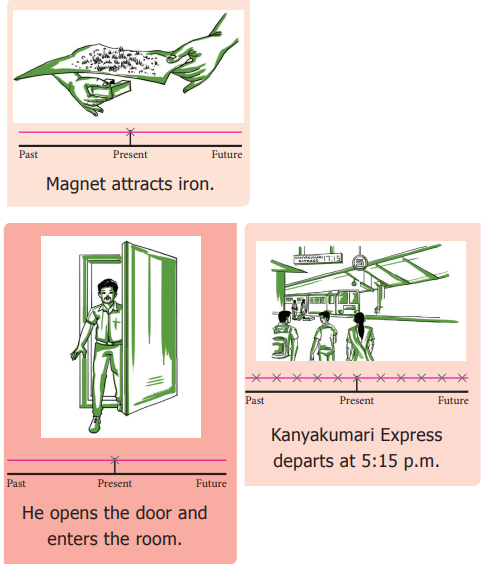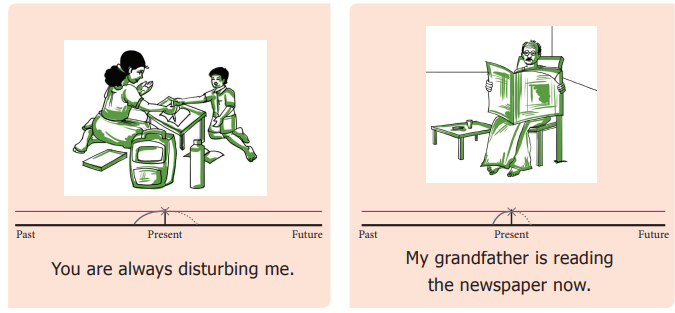Trip to Ooty - Prose - Term 2 Unit 2 - 6th English - Grammar | 6th English : Term 2 Unit 2 : Prose : Trip to Ooty
Chapter: 6th English : Term 2 Unit 2 : Prose : Trip to Ooty
Grammar
PICTO GRAMMAR
SIMPLE PRESENT TENSE
SIMPLE PRESENT TENSE

Simple Present Tense
a. Facts
that exist at all times: Magnet attracts iron.
b. Permanent
situation: I live in Chennai.
c. Expressing
actions happening now: He opens the door and enters the room.
d. Habitual
actions: Ravi goes to school at 8:30 a.m.
e. Future
reference: Kanyakumari Express departs at 5:15 p.m.
Venkat
will leave the class as soon as Anbu arrives.
PRESENT PROGRESSIVE TENSE

Present Progressive Tense
a. Unfinished
Actions Now : My grandfather is reading the newspaper now.
b. Annoying
Habits : You are always disturbing me.
c. Definite
Future Plans with time word: The Prime Minister is visiting Chennai tomorrow.
SIMPLE PRESENT TENSE
We use the simple present tense in
the following contexts.
1. To express facts that exist at
all times
i)
Wood floats
on water.
ii)
Water boils
at 100°C.
iii)
The sun rises
in the east.
2. To denote a permanent situation
i)
Abdul lives
in Dubai.
ii)
The Vaigai
flows along Madurai.
iii)
Snakes swallow
frogs.
3. To express an action happening
now
i)
The doctor gets
ready to go to the clinic.
ii)
The athlete puts
on his shoes.
iii)
My father takes
the newspaper and begins to read.
4. To express habitual actions
i)
Latha goes
to school at eight thirty.
ii)
Every morning I drink a cup of coffee.
iii)
My uncles comes
home at 6 p.m.
5. To express future reference
i)
The aeroplane takes off at 9 a.m.
ii)
The Chief Minister opens the exhibition tomorrow.
iii)
Our annual examination starts next week.
PRESENT PROGRESSIVE TENSE
1. To express unfinished actions happening
now.
i)
My mother is
cooking now.
ii)
Devaki is
cleaning the vessels in the kitchen now.
iii)
At present my friends are practising for the friendly match.
2. To denote annoying habits
i)
You are
always asking
me for money.
ii)
The little girl is always crying.
iii)
The old man is
always complaining about his sons.
3. To express definite future plans
i)
The President is leaving for the States tomorrow.
ii)
The Flood Relief Committee is coming here the day after tomorrow.
iii)
They arc writing
the final examination tomorrow.
SIMPLE PAST TENSE
1. To express completed action
i)
It rained
heavily yesterday.
ii)
We went to
a movie last Friday.
iii)
Milton wrote
’Paradise Lost'.
2. To express actions in stories
i)
Every one laughed at him.
ii)
The captain came home after two months.
iii)
Little Sarah opened
the door and welcomed the guests.
PAST PROGRESSIVE TENSE
1. To indicate overlapping actions.
i)
When my entered the kitchen the cat was drinking milk.
ii)
You were watching
TV when we came in.
iii)
While he was
going to school someone called him.
2. To indicate past habits
i)
As children we were playing kabaddi.
ii)
My mother was
doing all household work when we were children.
iii)
We were shopping
regularly during our visit to Mumbai.
3. To emphasize length or duration
i)
John was studying
till 11.30 p.m. every night.
ii)
The labourers were working hard from dawn to dusk.
iii)
It was raining
all through the night.
4. To recall the past
i)
I could remember you were painting the door.
ii)
We went to the new building. The men were carrying cement bags from the lorry.
iii)
It was raining
hard when the accident took place.
J. Read the sentences given below. Does the action happen
every day or is it happening at this moment?
1.
Deepa waters the plants every morning happens every day
2.
A triangle has three sides. happens every day
3.
Sandhya is writing a letter. is happening at this moment
4.
The children are playing in the garden. is happening at this moment
5.
I go to school regularly happens every day.
K. Read the sentences given below and circle the
verbs appropriately.
1. Children like like/likes ice-creams.
2. Birds is flying is flying/are flying in the sky.
3. The doctor is treating is treating/ are treating the patient.
4. Our school commences is commencing/commences at 9.00 in the morning.
5. The florist sells sell/sells flowers on the street.
L.Vimala and Srinath have met after a long time.
Read the conversation given below and complete the dialogue. Role play the situation
with your own words.
Vimal: Hello Srinath,
I haven’t seen you for a long time. Where are you rushing off?
Srinath: I am going to the hospital.
Vimala: Why are you
going to hospital? Are you ill?
Srinath: No, I want to see my friend.
Vimala: Oh! What happened
to him?
Srinat: He met with an accident.
Vimala: Are you free tomorrow?
Srinat: Yes, I am free.
Vimala: You are in a
hurry, meet you tomorrow. Take care.
Srinath: Ok! Bye.
SIMPLE PAST TENSE

Simple Past Tense
a. Completed action: Merlin went to Ooty last week.
Shakespeare wrote ‘The Tempest’.
b. Actions in stories:
She boarded the train and looked for her friends.
PAST PROGRESSIVE TENSE

Past Progressive Tense
a. Overlapping
action: When I entered the room, the telephone was ringing.
b. Past
habits: Arun was eating a lot of junk food those days.
c. Emphasis
of length or duration: Malathi was watering the plants all day.
d. Recalling
the past: It was raining that day. I remember it well.
M. Sinduja is getting ready to sleep. She starts
writing her diary. Help her complete it by using the verbs given in brackets.
(start eat have finish
go reach)
1. I got up at 7’O clock.
2. I ate breakfast.
3. I went to office by car.
4. I started to work.
5. I had lunch at at 2 p.m.
6. I finished my task at 7 p.m.
7. I reached home at 8 p.m.
N. Read the sentences carefully and fill in the blanks
with suitable tense form of the verbs given in brackets.
1. The doorbell rang, while I was doing (do) my homework.
2. We saw an elephant,
while we were going (go) on a trip to Ooty.
3. Mary fell asleep
while she was reading (read) a book.
4. The television was
on but nobody was watching (watch) it.
5. Baskaran hurt his
hand while he was cutting (cut) mangoes.
Related Topics